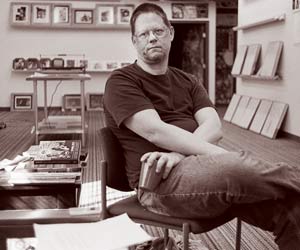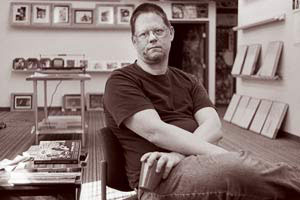
Photo: Mark Murrmann
William T. Vollmann contains multitudes. Over the course of his career, the insanely prodigious 49-year-old author has cranked out nearly 20 works of fiction and nonfiction on themes ranging from Native American history (the still-uncompleted seven-volume Seven Dreams) to World War II (Europe Central, which won a National Book Award in 2005) to his experiences hopping freight trains, befriending prostitutes, and smoking crack. He’s traveled the world seeking out extremity; he’s nearly frozen to death in the Arctic and survived hitting a land mine in Bosnia. And he’s not afraid to go long: Several of his books are massive, most notably Rising Up and Rising Down, a seven-volume, 3,300-page exegesis on the morality of violence. While Vollmann has earned critical acclaim and the odd mention as a future Nobel laureate, he may be America’s best-known unread author.
When he’s not seeking out new stories, Vollmann works out of a former Mexican restaurant in Sacramento, California, that he has turned into an enviably spacious studio. Ringed by concertina wire, the nearly windowless building is a secret clubhouse of sorts; the phone number’s listed under an assumed name. Vollmann sleeps in what used to be part of the kitchen; a walk-in freezer serves as a closet. “I keep books and bullets in there,” he says, gesturing to a closed door. A nearby wall is plastered with old press passes.
There’s a well-equipped darkroom, and drawings, photographs, and photogenic prints line the walls and cover tables in the old dining room. Like his writing, Vollmann’s viusual art is driven by his obsessions rather than any desire to please critics or popular tastes. “I’m not sure what this is,” he deadpans as he displays a close-up photo of a woman’s crotch. “Lots of research necessary.”
On paper, Vollmann can be an intimidating figure. First, there’s the years worth of books he’s written (a few years ago, some lit-bloggers tried to tackle his body of work by divvying it up into more manageable chunks; they’re still plunking away). His unsmiling author photos, including one in which he’s holding a pistol to his head, add to the aura of an intensely single-minded savant. In person, Vollmann is disarmingly hospitable and humble. He’s unconcerned with whether you’ve read any of his work and often turns questions back on the interviewer in a way that’s not ornery but inquisitive. The overall impression is of an artist who’s animated by a boundless curiosity and possessed by a remarkable resistance to jadedness.
After a couple of hours of conversation and a few mugs of scotch, Vollmann’s “train-hopping buddy” Steve drops by. Vollmann hands him a copy of Imperial, his forthcoming 1,300-page nonfiction epic that explores immigration, drugs, and water in the borderlands of Southern California and Baja California. (Excerpts from it and from an accompanying photo book of the same name appear in the current issue of Mother Jones.) “Holy shit!” exclaims Steve, who was featured in Vollmann’s considerably shorter memoir Riding Toward Everywhere. They head out to the tracks behind the studio, where a long line of empty double-stack cars stretches around a curve, and discuss the finer points of “catching out.” Steve says he likes to hop on grainers. Vollman prefers boxcars—they can be tricky to get into, but then you can stretch out and enjoy the ride.
Vollmann spoke with Mother Jones about his latest book, the irrelevance of popularity, his distrust of the Internet, and his adventures along the border.
Mother Jones: Imperial isn’t just about California’s Imperial Valley. Could you talk about this concept of “Imperial” that you introduce in the book?
William T. Vollmann: At first, I thought my book was only going to be in Imperial County, and then I realized that there’s a county line that goes right through the Salton Sea, so part of Riverside County is really in this whole area, too. And up there is the Coachella Valley: In Imperial County it’s called the Imperial Valley; across the border it’s called the Mexicali Valley. But it’s all one place and it’s so bizarre to go up and down the border and see on either side of the imaginary line very, very different landscapes. There are places where the US, “Northside,” is just this paradise of hay bales and fields and everything is so green and on the other side it’s just barren, and there are places where the Mexican settlements go right up to the border and on the American side is just dirt. It’s so bizarre, and it makes you think, How can this happen and what does it mean? I decided that there is really some sort of entity that I call Imperial, and I decided to extend it all the way along the California-Mexico border and into Tijuana and then to the Pacific because it all has a similar feeling.
MJ: You saw stark contrasts along the border, but you also write about Imperial as “the continuum between Mexico and America.”
WV: You’re right. What does that mean? We’re living in what used to be Mexico, and there’s this very fluid border feeling. You go a little bit south of Tijuana, for instance, into Ensenada, and it still seems kind of borderlike. And you go much farther, suddenly the prices are lower, the prostitution is different, the commerce is different, everything feels more “Mexican.”
MJ: Some people have talked about the border as essentially a third country. It’s not the US, it’s not Mexico—it’s some sort of hybrid of the two.
WV: That makes a lot of sense. There are parts of L.A. that feel very, very Mexican, and there are weird little enclaves of Northside in Mexico—Cancún for instance. So what is a border?
MJ: Talk about the terms “Northside” and “Southside,” which you use throughout the book.
WV: Those are border patrol terms. I never heard anyone who wasn’t in the border patrol use them, but I think they’re perfect. When they’re talking about command apparatus, the border patrol always referred to the US as “alpha” and the Mexicans as “beta.” I imagine the Mexicans do it the other way around.
MJ: Well at least it isn’t “omega”—that would be really insulting. You write that Imperial was originally going to be a piece of fiction, and then you decided that wasn’t the right way to go.
WV: At least for me, it takes more knowledge to write fiction than nonfiction. At least about someplace that I begin with a lot of ignorance about. You could imagine writing about a prostitute, for instance, but if you haven’t spent time with prostitutes then you’re going to get all these details wrong. But if you have a lot of sex with prostitutes and you’re friends with prostitutes and you interview prostitutes, then maybe after many, many years you might be able to create prostitute characters. I feel like I’m almost ready to write fiction about the border. But even after 10 years of writing nonfiction about it, I don’t think I know quite enough to do it right.
MJ: You spent at least a decade going down there and talking to people and you still felt that wasn’t enough to write fiction about it?
WV: If I was going to write some fiction—and actually I plan to write some border love stories—I’ll have to get real stories from real people and try to work those in. Whereas if I want to create a prostitute character now from memories of different prostitutes and inventing stuff, I can say, “this could happen,” “this is quite plausible.” But I don’t feel I know enough about border life to do the latter.
MJ: Does that make you question the fiction you wrote when you were younger and didn’t have the same depth of experience to tap into?
WV: No, I don’t think so. I think—at least I hope—that the fiction I’ve written so far has flaws but has mostly been successful. I was either able to create stuff from my head or else I stuck closely to what I knew. Hemingway always said, “Write about what you know.” I think you can do that, and if you want to write about what you don’t know, you can. It just takes a lot more work.
MJ: That’s interesting because so many people assume that fiction has a lower burden of accuracy than nonfiction. It seems like you’ve turned that stereotype on its head.
WV: I think that we’re all, as human beings, so limited. If we want to write about ourselves, that’s fairly easy. And if we write about our friends or our families, we can do that. But if we want to project ourselves somewhere beyond our personal experience we’re going to fail unless we get that experience or we borrow it from others. When I go train hopping and I look up into the sky, there are always so many more stars than I remember there were. Have you done that? You think you might want to do that sometime?
MJ: After reading Riding Toward Everywhere, it sounds like a lot of fun.
WV: This is a great place to do it.
MJ: So have you caught out lately?
WV: Recently, but I didn’t go too far, though. Some friends and I, we went right up there behind the studio and we got on a train, we could tell it was going to go to Roseville. We got off it and got on another train. And we got to Roseville, and it takes hours to get through that yard. It’s really big. So we ended up just coming back here. It’s like fishing or hunting. You can’t always come back with something.
MJ: Water is a big part of Imperial. There’s already a pretty significant body of work about water in California, anything from Chinatown to Cadillac Desert and Joan Didion. I’m curious about how you got into the water question.
WV: I think the Marxists are right when they say that you can’t understand the cultural superstructure without the economic substructure. And in Imperial so much of the appearance of the various delineations has to do with water. You can’t understand why things look the way they do without understanding water rights and water theft and so on. They say that you can take anything out of water except salt and politics—I think it’s really true. And I never understood before the basic self-defeating quality of irrigation. As you irrigate you are passing over soil that has trace amounts of salt in it and so you are gradually salinizing the irrigation water itself. When the water evaporates, it leaves more salt behind and draws more water up through the earth, bringing up more salt. So you need more and more water to irrigate the same amount. It’s actually quite frightening.
MJ: Especially when you’re irrigating an area like Imperial that is, for all intents, a desert.
WV: Yeah—or any area. In the long run there’s a good chance you will make it into a dessert. No one knows exactly how much of California has been removed from fertility as a result of salinity, but probably quite a lot.
MJ: That’s so ironic, because that fertility was the basis of so much of the state’s economy and expansion—the California Dream.
WV: That’s right. You really wonder what’s going to happen. In Imperial County now, it’s quite ugly the way that some of the so-called “water farmers” are just selling their water rights. And that water is not enough for San Diego and Los Angeles. A lot of people in Imperial County didn’t want to sell but they were more or less forced to sell by the Interior Department. And so they’re having to fallow fields. I guess that’s a typical story of might makes right.
MJ: Do you think there’s any way to restore any kind of balance or fairness in how water is allocated?
WV: Swine flu maybe. [Laughs.] I guess all the four American states with the Colorado River Compact want more water than the river has and meanwhile there’s still Mexico’s share. So as the population increases it’s only going to get uglier.
MJ: We’re always being told to conserve water and not flush the toilet. Then you realize that our personal usage is literally a drop in the bucket compared to agriculture and industry.
WV: This place was a Mexican restaurant before I bought it. So it’s zoned commercial. And my water bill always has an adjustment; no matter how much I use they’ll say, “Okay, we’ll charge you a little more to bring you up to your minimum.” I could probably leave the toilet running literally for a month.
MJ: I want to talk to you about a couple of episodes you describe in Imperial. One of them is boating down the New River, which is the most polluted river in North America.
WV: So they say. It just—it stinks. Although when I had the water tested it wasn’t as bad as I expected. But yeah, it was kind of an adventure. No one in Imperial County could think of anyone who had done it recently, you know, maybe in the last 40 years or whenever. My friend Jose Lopez and I, we bought a dinghy at Wal-Mart and we went as far as we could and then the dinghy started to sink. And then we got out, dripping with this awful taste in our mouths for the next few days. And then there was one commercial guide in the Salton Sea—the last one apparently. So we went up and down the stream with him and then we hit a sunken bridge and then we couldn’t go down any farther. But it was quite beautiful in a way. Because there was a big flood in 1905 or ’06. That’s how the Salton Sea was formed; it was an accident. And the Colorado River in its entirety went through the New River Gorge so it just ate and ate through there like crazy. So when you’re going down there this canyon sort of rises up over your head. And you almost feel like you’re an 18th-century explorer. And after maybe three or four miles it doesn’t stink very much. You don’t hear any frogs or anything but you do stop seeing dead birds, which is always nice.
MJ: In another chapter, you used a hidden camera to investigate maquilladoras.
WV: Yeah. Homeland Security wasn’t too happy about that. As result of that one I was detained for about seven hours. They called the FBI. Idiots.
MJ: So how many times did you get detained at the border?
WV: Oh, three or four. So far.
MJ: You think at some point they’d recognize you…
WV: Yeah, I said, “Wouldn’t it save you guys time and money if you just put down that you’d checked me out before?” And they got kind of huffy and they were like, “Well, we’re going to do it the way we’re going to do it.”
MJ: You probably just added two hours to the whole ordeal. I really liked the chapter where you had a satire of hard-boiled fiction from a custom agent’s perspective and he’s like, “I was going to break this Vollmann guy.”
WV: Yeah, they were so helpful. They got some big-time terrorist!
MJ: You’ve described yourself as a member of the “Society of Fat Books.” Do you ever worry that with every additional page you write you’re diminishing the number of potential readers?
WV: Everything has a life. We all have lives and everything comes to an end. So I don’t think that we should be concerned with making everything we create and everything we do more popular. There will come a time when nobody reads my books and no one remembers who I was. And in the meantime, I’ll do it my way.
MJ: You’ve had fights with your editors when they’ve asked you to bring stuff down.
WV: Oh yeah. They usually say, “Well, we’ll cut your royalties in half and you can keep the book as long as you want.” And then I promise never to do it again. It works out.
MJ: You’ve written big books and little books. How do you know going in if it’s going to be a big project or a little project? Poor People is about 300 pages and that takes on the question of global poverty, but in Rising Up and Rising Down you wrote 3,000-plus pages on violence. How do you know whether a book will be short or long?
WV: It’s just as long as it needs to be. When I wrote Seven Dreams—or the ones I’ve written so far—I had no idea that they would be more than a single volume, and it just kept expanding. With Rising Up and Rising Down, I didn’t know that it would take me 23 years. I figured that would be an essay that was maybe 50 pages long about when it’s appropriate to engage in civil disobedience against nuclear power.
MJ: You don’t do much online. Why not?
WV: Well there isn’t really any good Al Qaeda child porn. [Laughs.]
MJ: I think you just added three more hours to your next border trip.
WV: You know, I have a couple issues with the Internet. One is the fact that you get spied on. That sort of pisses me off. But I guess what really creeps me out is the mutability of the so-called information. When I was writing Imperial I could go into a library and pull out some dusty book and it was so obviously dated. The biases in the book become more and more clear with time. And there it is; until they pull the book from the stacks no one can deny that this is what we said: “Everyone hates Chinamen and darkies and Mexicans are subhuman” and this and that. Black and white. But if it were on the Internet they would just gradually revise it. And you go back to the website two or three years later—and I’ve had this experience—and the stuff isn’t there anymore. It’s like the memory holes of 1984. I think that’s very insidious. It would be so nice if, say, the Library of Congress made archival hard copies of the Internet each day. Because then you would have copies of something you could trust 100 years from now.
MJ: Do you ever think of your works as having a future in a digital form?
WV: Sure. Why not? But I’d be happy if they had a paper future as well. You know, I have some people living in my parking lot, and they don’t have laptops. Sometimes I see them reading. A book is such a great piece of technology in that regard. You don’t need batteries. You don’t need anything but daylight.
MJ: And time.
WV: I think we’re all going to have a lot more time. The US is losing its economic clout. There are going to be fewer jobs. We’re all going to be idler, as productivity is measured. So hopefully instead of spending all of that time looking for nonexistent jobs we’ll have more time to talk about the future and the past. It won’t be all bad, you know?
MJ: Have you been able to keep in touch with other people you’ve written about in the past? Folks in San Francisco, in the Tenderloin or on Capp Street?
WV: Yeah, there are some who I met in the ’80s who I still see, but a lot of them are dead.
MJ: When you’ve written a book like Imperial, will you show it to the people in it, like your friend Lupe Vasquez?
WV: Yeah, especially the photo volume. I’ll enjoy giving him a copy of that. My friend Jose Lopez, who used to sleep in the street, he always thought Lupe was lucky because he could come across the border and slave in a broccoli field all day, and he kept getting deported so he couldn’t do what Lupe had done. I’d really like to see him and give him a copy of it. They’re amazing guys. It makes me feel so lucky that I don’t have to struggle like that. Especially at my age. I mean, I couldn’t do it.
MJ: Prostitution’s been a big theme in your work. Have your attitudes toward or your relationships with prostitutes changed?
WV: Well, I’m getting older so I can’t get it up as much as I used to.
MJ: Has anyone given you a, um, hard time about that? Publishers, people who don’t want to touch your work?
WV: Yeah, some people don’t like it. That doesn’t really bother me. I think prostitutes are amazing people with so much knowledge of human nature and so many fantastic stories. Some of them are scam artists, but most of them are very, very brave and a lot of them compassionate. I think it should be legalized.
MJ: In the collection Expelled From Eden, there’s a chronology of your career and it ends in 2010 with you dying from a self-inflicted gunshot wound.
VW: Oh—getting close now.
MJ: Who stuck that in there? What’s up with that?
WV: You know, one of my Seven Dreams was this book called Argall. It’s about John Smith and Pocahontas. And the LA Times wanted me to review my own book. So I figured the only way I could do it would be to give it the most negative, blistering review that I could. So I acted like I was some kind of superpatriot. And I said how sleazy this guy was and how great it was that he had finally killed himself in a gun accident in 2010. It was just the week before we started bombing Afghanistan. And I talked about how we liberated the world by bombing Afghanistan and bombing Iraq and bombing Iran. And they took the stuff about Afghanistan out.
MJ: But they still let you kill yourself?
WV: Yeah.

















